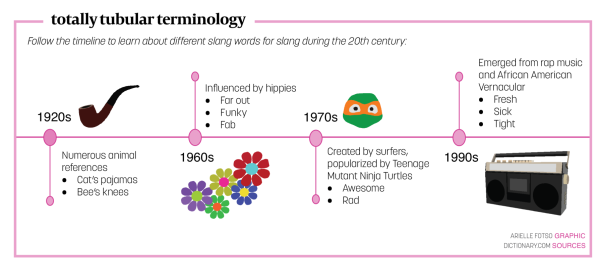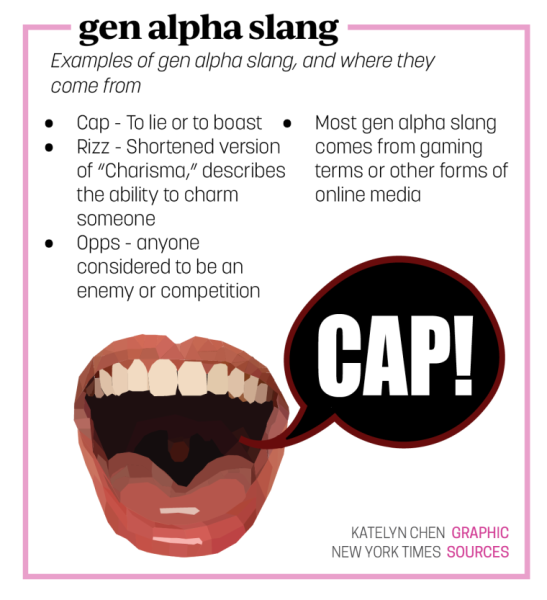Slang is everywhere, from the screens of teenagers to casual conversations nationwide. According to a 2023 WordsRated report, 80% of Americans say they use slang, with 20% using it in every conversation. This significant number calls for the understanding of slang words, their evolution and current use. Junior Kate Jentz said all slang has a sense of casualness.
“Slang is casual words that become popular,” Jentz said. “It’s become extremely common in chatting between teenagers since it’s easy to understand. Slang words can even be old words that people are repurposing.”
Tony Willis, long-term English substitute teacher and former English teacher here, said some may use slang as their personalized language.
“Every generation has slang you speak so adults can’t understand what you’re saying,” Willis, who subbed for English teacher Enid Baines’s entomology class, said. “It’s almost your own vernacular, your own language that you can speak. Examining slang shows how language changes.”
Similarly, senior Jossi Sorg said the informal use of slang can be separate from older generations.
“Slang allows you to communicate more complex things in a simpler way,” Sorg said. “However, older generations don’t need to stay up to date on the latest slang. Sometimes parents will use a word and think it’s the new hip thing, but I don’t think that’s necessary.”
In a technology-driven world, freshman English teacher Mark Wien said the progression of slang can be credited to the frequency in its usage.
“The evolution of slang has changed with social media and texting,” Wien said. “In the old days, slang would have been verbalized. Now, we’re writing it and typing it so we see it all the time.”
With the evolution of slang, Jentz said there’s still connections between slang ranging from generation to generation.

“There’s different slang for different generations,” Jentz said. “The words people use in situations are going to differ, but the meaning might be the same.”
Although every generation uses slang, Sorg said social media has increased slang usage in younger generations.
“The current generation uses slang more frequently than older generations did,” Sorg said. “Social media has sped up the spread of slang, one person can start a trend and with that comes a word that everyone posts about.”
With social media, Wien said students have a more accessible outlet for slang.
“Social media normalizes the use of slang,” Wien said. “People used to only type using formal grammar and now it’s normalized to use slang and have a lack of punctuation. Formal communication between youth is slowly disappearing. The question becomes, at what point is formal grammar and punctuation gone? Over time, that might happen.”
While formal communication between youth may be declining, Willis said students are able to uphold formalities when necessary.
“People use language differently on Instagram than they would on a college admissions letter,” Willis said. “I hope students continue making that distinction between when it’s appropriate to use informal language and when it’s not.”
Conversely, Sorg said she’s noticed difficulty for her peers in switching grammatical styles.
“Recent uses of slang definitely impacts grammar,” Sorg said. “With texting, people are used to abbreviations or shortening words. In school, people may have trouble switching between that grammar style and a formal one.”

Willis said the informality and specificness of slang can create identity and bring groups together.
“The term code-switching refers to how a teenager will speak differently to a teacher than you will to someone your own age,” Willis said. “When Vice President Harris spoke in Indianapolis to a majority Black sorority, she used some different terms and slang than she would if speaking to a different group at the White House. Not only can slang create identity, it’s about sharing your language with a similar group of people.”
While slang may create a sense of belonging, Wien said it may have the opposite effect for some.
“I think everyone uses slang to the point they’re comfortable with,” Wien said. “In some ways, slang allows the younger generations to exclude the older generations. Younger people create their own identity through language, which helps them dissociate from older groups.”
As slang creates identity for different people, Jentz said these identities can be shared throughout the world.
“There are words that we don’t even think about and are used in everyday language,” Jentz said. “Those words might be from another language or culture, which was spread through social media. Global connectivity reflects how quickly information, including slang words, can be spread throughout the world.”
Willis said he’s witnessed the global connectivity of slang firsthand.
“Twenty-five years ago, I was a part of an exchange program in Germany,” Willis said. “Even before social media, in a different high school, some of the slang German seniors in high school were using was the same slang our seniors had used a year before. Slang is universal.”
As technology and global connectivity evolves, Wien said the prevalence and spread of slang will continue to accelerate.
“As we can communicate instantaneously throughout the world, new slang can take off in days rather than years,” Wien said. “Slang spreads like wildfire.”

































![AI in films like "The Brutalist" is convenient, but shouldn’t take priority [opinion]](https://hilite.org/wp-content/uploads/2025/02/catherine-cover-1200x471.jpg)









































![Review: “The Immortal Soul Salvage Yard:” A criminally underrated poetry collection [MUSE]](https://hilite.org/wp-content/uploads/2025/03/71cju6TvqmL._AC_UF10001000_QL80_.jpg)
![Review: "Dog Man" is Unapologetically Chaotic [MUSE]](https://hilite.org/wp-content/uploads/2025/03/dogman-1200x700.jpg)
![Review: "Ne Zha 2": The WeChat family reunion I didn’t know I needed [MUSE]](https://hilite.org/wp-content/uploads/2025/03/unnamed-4.png)
![Review in Print: Maripaz Villar brings a delightfully unique style to the world of WEBTOON [MUSE]](https://hilite.org/wp-content/uploads/2023/12/maripazcover-1200x960.jpg)
![Review: “The Sword of Kaigen” is a masterpiece [MUSE]](https://hilite.org/wp-content/uploads/2023/11/Screenshot-2023-11-26-201051.png)
![Review: Gateron Oil Kings, great linear switches, okay price [MUSE]](https://hilite.org/wp-content/uploads/2023/11/Screenshot-2023-11-26-200553.png)
![Review: “A Haunting in Venice” is a significant improvement from other Agatha Christie adaptations [MUSE]](https://hilite.org/wp-content/uploads/2023/11/e7ee2938a6d422669771bce6d8088521.jpg)
![Review: A Thanksgiving story from elementary school, still just as interesting [MUSE]](https://hilite.org/wp-content/uploads/2023/11/Screenshot-2023-11-26-195514-987x1200.png)
![Review: "When I Fly Towards You", cute, uplifting youth drama [MUSE]](https://hilite.org/wp-content/uploads/2023/09/When-I-Fly-Towards-You-Chinese-drama.png)
![Postcards from Muse: Hawaii Travel Diary [MUSE]](https://hilite.org/wp-content/uploads/2023/09/My-project-1-1200x1200.jpg)
![Review: "Ladybug & Cat Noir: The Movie," departure from original show [MUSE]](https://hilite.org/wp-content/uploads/2023/09/Ladybug__Cat_Noir_-_The_Movie_poster.jpg)
![Review in Print: "Hidden Love" is the cute, uplifting drama everyone needs [MUSE]](https://hilite.org/wp-content/uploads/2023/09/hiddenlovecover-e1693597208225-1030x1200.png)
![Review in Print: "Heartstopper" is the heartwarming queer romance we all need [MUSE]](https://hilite.org/wp-content/uploads/2023/08/museheartstoppercover-1200x654.png)




